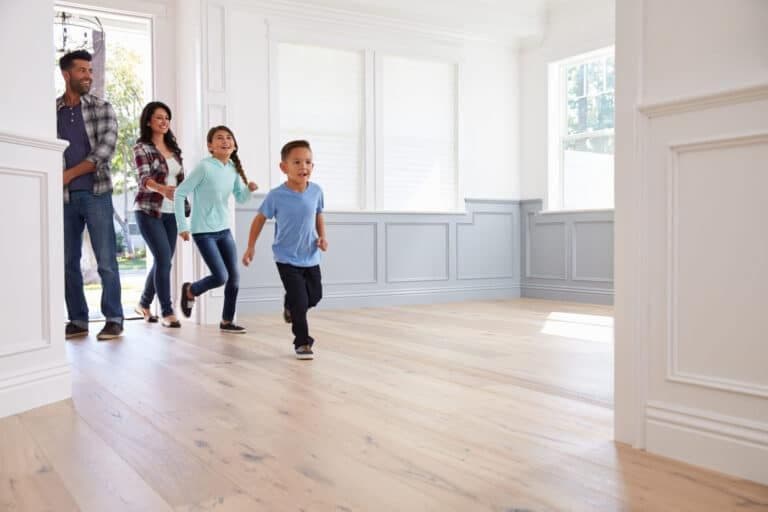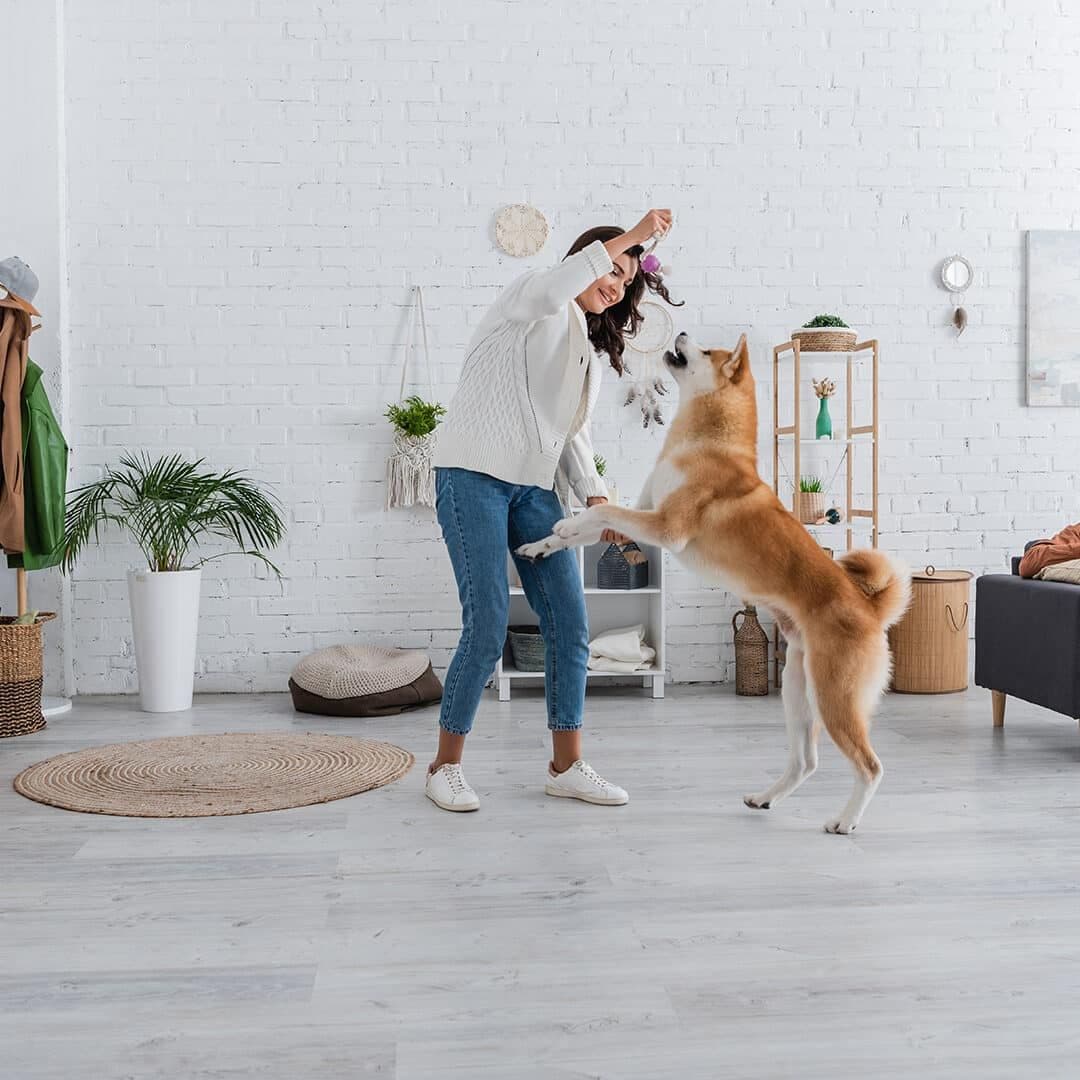What is the Best Flooring for Basements?
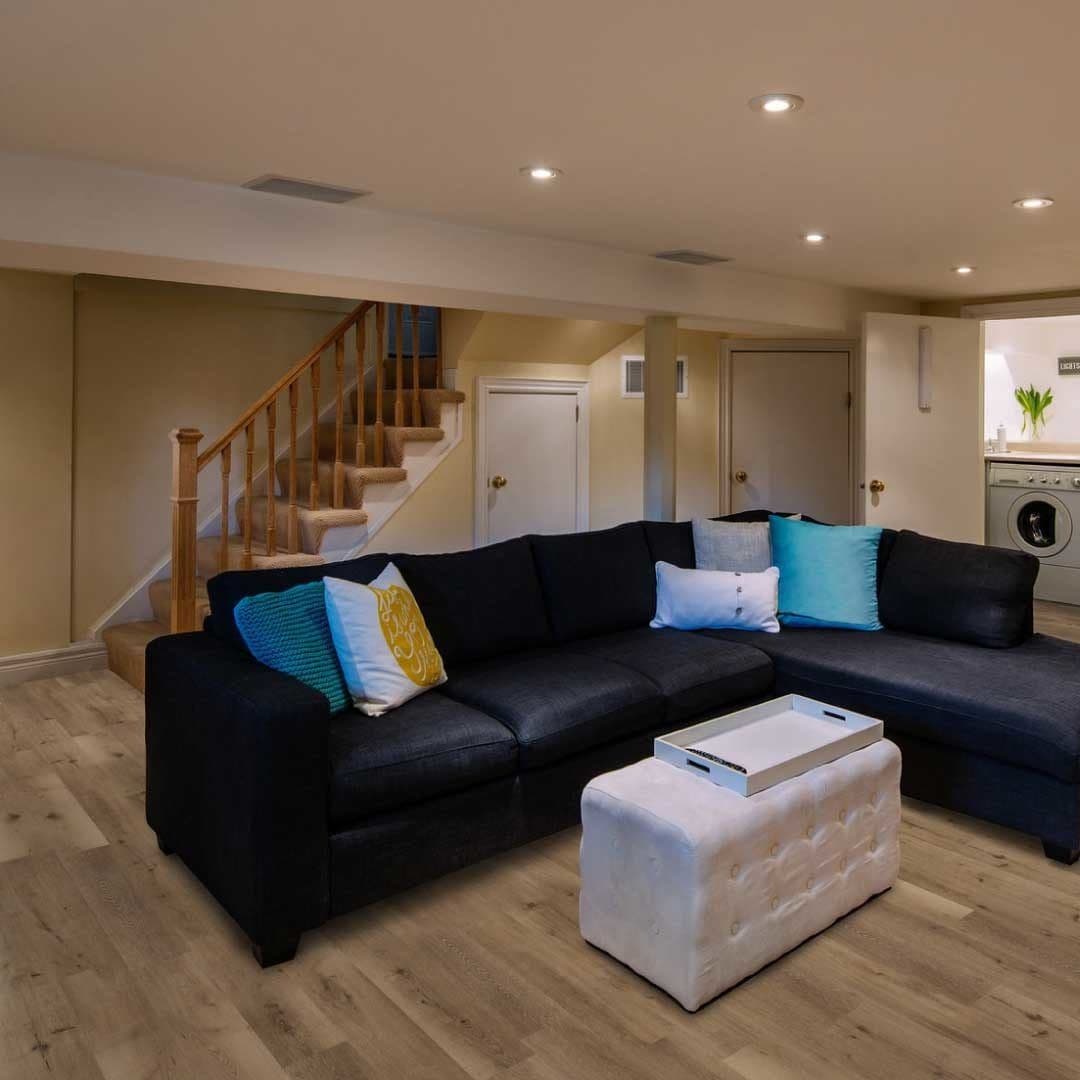
What is the Best Flooring for Basements?
When deciding to finish or remodel your basement it is important to choose materials that can withstand the moist environment of a basement. Choosing a flooring to install in your new lower level can be difficult with so many options being available. In this post we will be covering what is the best flooring for basements, especially for the humidity of the Midwest, as well as the other options available!
Similar to any material being used in your finished basement, the most important factor of the product should be water resistance. Not only is your basement very humid, it is also extremely prone to water events such as flooding and leaking. When such an event occurs, you do not want to have to throw away all of your flooring, that would be a big time and monetary expense. Think about what will happen to your flooring if your sump pump overflows, a pipe bursts, or your washing machine overflows, these are all very common occurrences in basements.
What basement flooring options and materials are the best?
The best type of flooring for basements is luxury vinyl plank. Vinyl plank flooring looks nearly identical to hardwood and stone products with the added benefit of being waterproof. Vinyl flooring can be made from a plastic-wood composite or a plastic-stone composite making it durable and waterproof. An additional benefit of vinyl basement flooring is the durability, since it is made of inorganic materials unlike wood, this makes it great for high traffic areas! Vinyl plank can be installed directly on your sub floor making installation faster and less expensive.
One of the common misconceptions of vinyl flooring is that it has a look and feel similar to old-style rolled linoleum. This was so your Grandma’s flooring!! Over the last few years, the design and construction of vinyl flooring has improved drastically. There are now endless colors and patterns, and the options make finding the perfect style for so easy.
We install luxury vinyl plank in every room of our customer’s homes today, including basements, due to the ease of care, the durability, the beauty and the waterproof properties. Giving our homeowners the peace of mind that their floor is safe from water damage is a big plus! Vinyl plank is also a floating floor meaning it is not attached to the sub-floor, so it can be more easily removed and replaced if repairs are needed.
Top Benefits of Vinyl Flooring:
· Waterproof
· Durable
· Large variety of colors and styles
· Plank construction
Examples of luxury vinyl plank basement flooring:
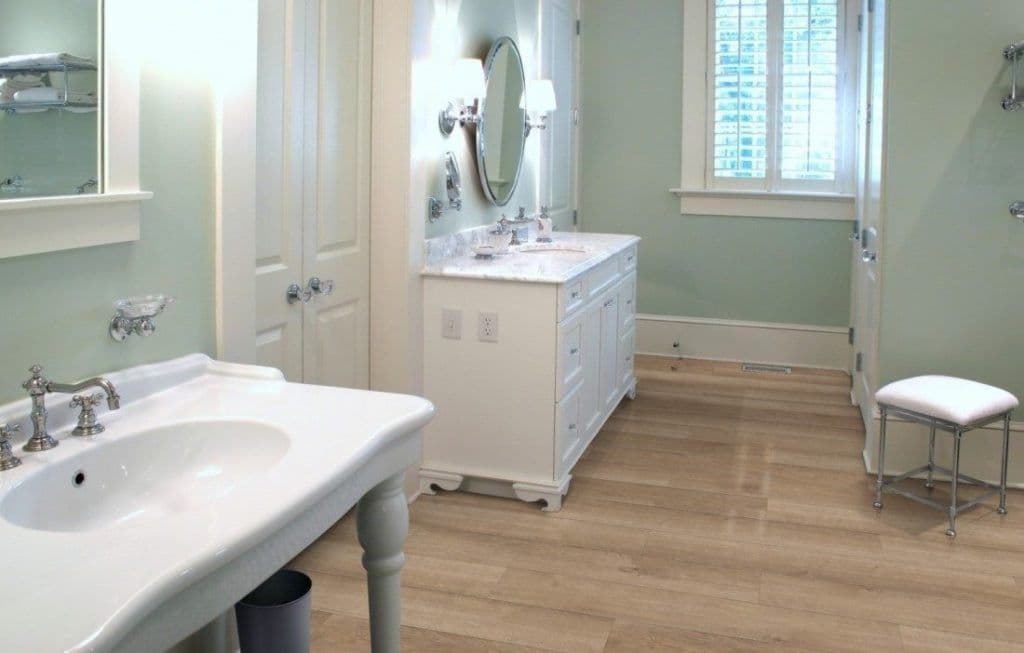
This basement had daylight windows which let just enough light to make this Copano Oak luxury vinyl plank flooring the highlight of the room. This waterproof flooring looks and feels like hardwood, but with none of the worry of wood, and comes with a lifetime warranty.
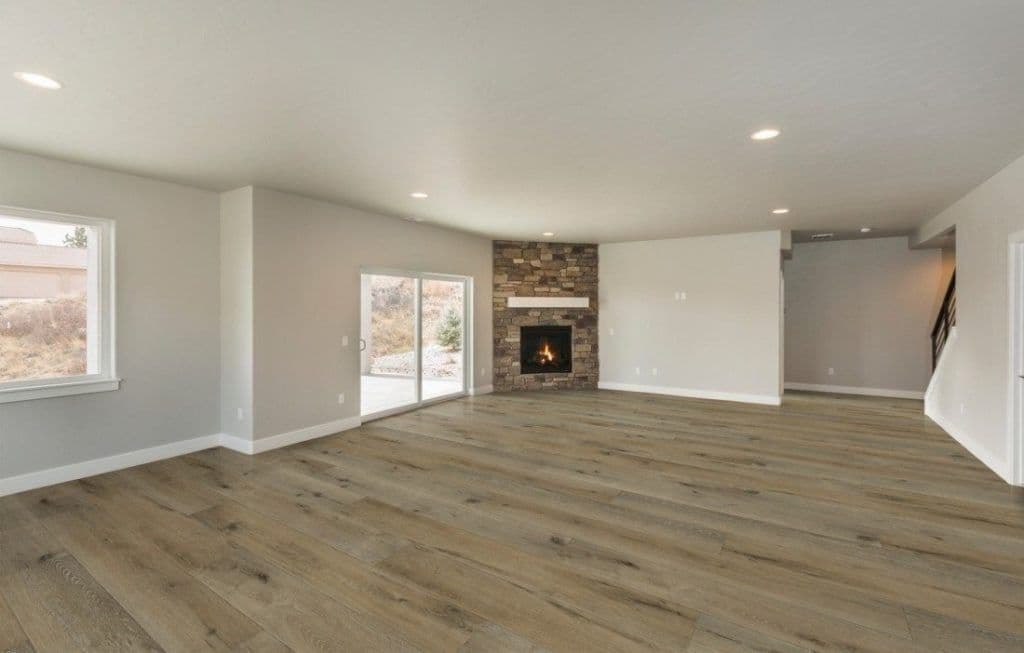
Pros and Cons of Basement Flooring Materials
Carpet for Your Basement
Carpet is another option for finished basements that many homeowners choose. Although it does not offer the waterproof and mold proof attributes of vinyl, some prefer it for its coziness – but when any fluctuations in temperatures happen and humidity sets in, or any water events happen, mold and mildew will develop quickly, and carpeting will have to be replaced to keep your home healthy. We recommend adding plush area rugs to finish luxury vinyl plank flooring. A great area rug will define a space, anchor the furniture and give a soft feel under the bare feet of summertime.
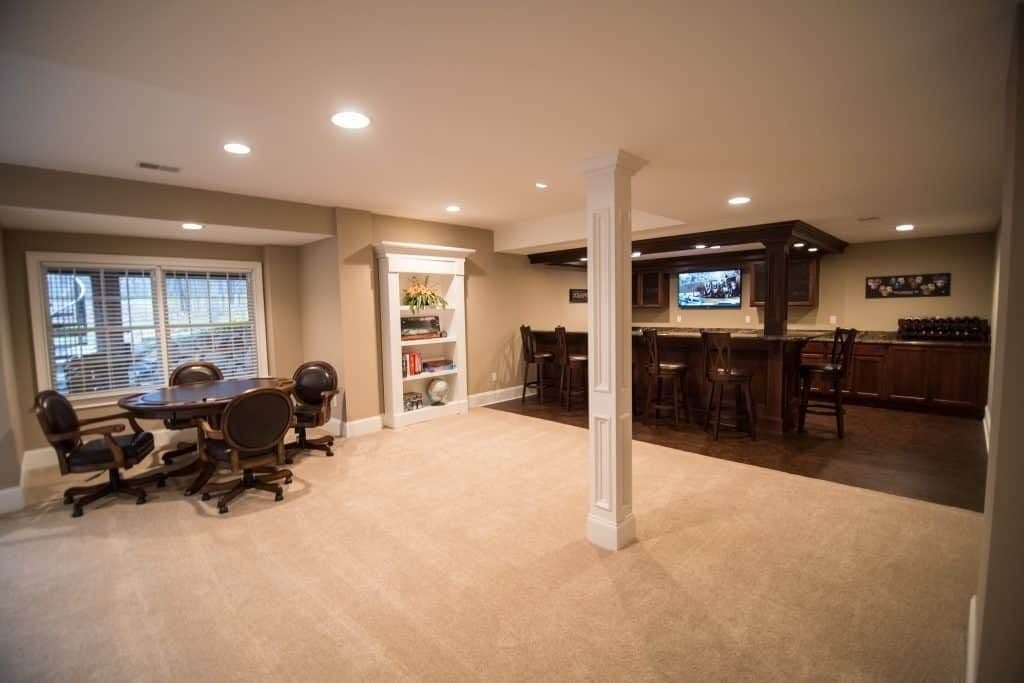
Pros:
· Cozy feel
· Can make for a quieter space
· Offers great cushion for hard basement floor
Cons:
· Not Hypo-Allergenic
· Not water resistant
· Can mold if left moist
· Stains easy if spilled on
· Allergy Trigger
Hardwood & Laminate Flooring for Basements
When it comes to basement flooring and basements in general, the less wood the better. Basements are a very humid and water prone environment where wood will not hold up well. Wood based flooring when placed in a basement will begin to warp and twist. Even without flooding, your basement foundation will have moisture leaking through which will form condensation underneath the flooring causing damage to the wood. Installing and replacing hardwood flooring can also be very costly and time consuming for homeowners as well.
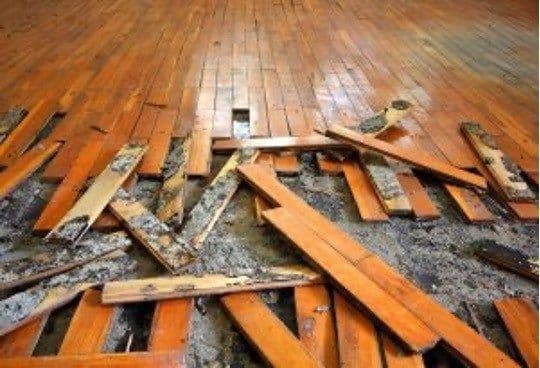
Pros:
· High-end look and feel
Cons:
· Extremely prone to water damage
· Will warp and twist
· Prone to mold
Ceramic Tile for Basement Floors
Ceramic tile is a viable option for basement flooring, although it has some drawbacks. When glazed, water cannot penetrate the tile making it a good choice for water resistance and stain resistance. Ceramic tile also comes in a large variety of sizes, shapes and colors to go along with any design. A big downfall of ceramic tile in the basement is the temperature and cost. Ceramic tile is adhered directly to the foundation making it very cold for basements. The cost and time to install ceramic tile is also much higher than most other flooring options.
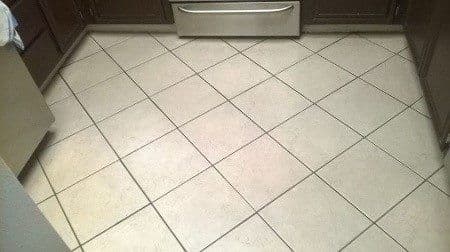
Pros:
· Water resistant
· Durable
· Long lasting
Cons:
· Cold to touch
· Hard on your feet
· Not design friendly
Epoxy Flooring for Basements
Epoxy flooring in basements is becoming a bit more popular than it used to be. It can offer a unique design choice while being easy to maintain and durable. One major drawback to epoxy flooring in basements is the temperature, like ceramic tile. epoxy flooring is very cold and hard on your feet. Depending on your uses for the basement a more padded flooring could be a better option. Epoxy flooring can be a great way to give your basement an industrial design.
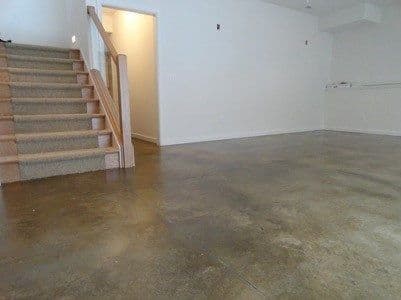
Pros:
· Water resistant
· Durable
· Long lasting
Cons:
· Cold to touch
· Hard on your feet
· Not design friendly
Things to think about when picking basement flooring:
1. Moisture Resistance
When choosing any materials for your basement, it is always best to ensure they are capable of handling moisture.
2. Durability
Depending on how you will be using your basement you may want to see how durable a product is. A playroom for the kids may need different flooring than a custom bar.
3. Comfort Level
Basements can be used for everything from an extra living room, home theater, or even a custom bar. Choose a flooring that is most comfortable for your specific needs.
4. Warmth
Keep in mind the temperature of your basement. The cold foundation will make for a colder floor if you choose a ceramic tile or epoxy.
Whether you are finishing your basement for added living space, an extra bedroom, an extra bathroom, a laundry room, playroom for your kids or even a custom kitchen or bar area, you will want to protect your investment by picking materials that will last for a lifetime. Research the materials being used for moisture resistance, durability and comfort level. Finishing your basement is no small task and requires lots of planning, research and help from the professionals. Luxury vinyl flooring is, by far, the best choice and best investment for your basement flooring remodeling projects. It has zero drawbacks and with Refloor’s 4-Part Lifetime Guarantee, you will enjoy your basement floors for life. They will increase the value of your home as you will be able to use them as a selling feature if you ever sell your home. If you are interested in new flooring for your basement, our specialists are here to help. We offer Free In-Home Consultations , bringing the store to you to see samples and colors to compare with your cabinetry and décor in your own homes lighting. We are your one stop shop to transform your basement floors and give your family a brand-new space for family celebrations and memory making!
Recent Posts
When it comes to upgrading your home, nothing transforms a space quite like new floors. And now, Refloor, the leader in fast, easy, and guaranteed-for-life flooring is bringing its award-winning process to the Chicago area...
Think All Luxury Vinyl Is the Same? Think Again. Luxury vinyl flooring is super popular in today’s homes—and it’s easy to see why! It looks ...
Which One’s Smarter? Thinking about getting new floors? Want something that looks like real wood but doesn’t need a ton of care? Luxury Vinyl...
Read What Refloor's Customers Are Saying
Product, services, and warranty sell themselves, but Ryan was an excellent interpreter of all information. He was professional, personable and patient with us throughout the process. Will definitely refer to friends and family.
I'm very satisfied with the work done by Josh and his helper . I am very happy with Sam by keeping me up to date on the scheduling before and after the work began. VERY HAPPY CUSTOMER
Super nice and very informative. Took time to explain every detail and answer all the questions we had.

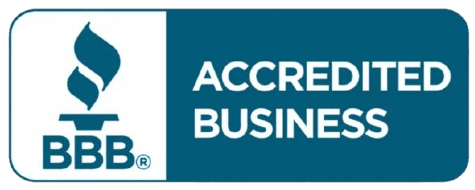


Contact Us
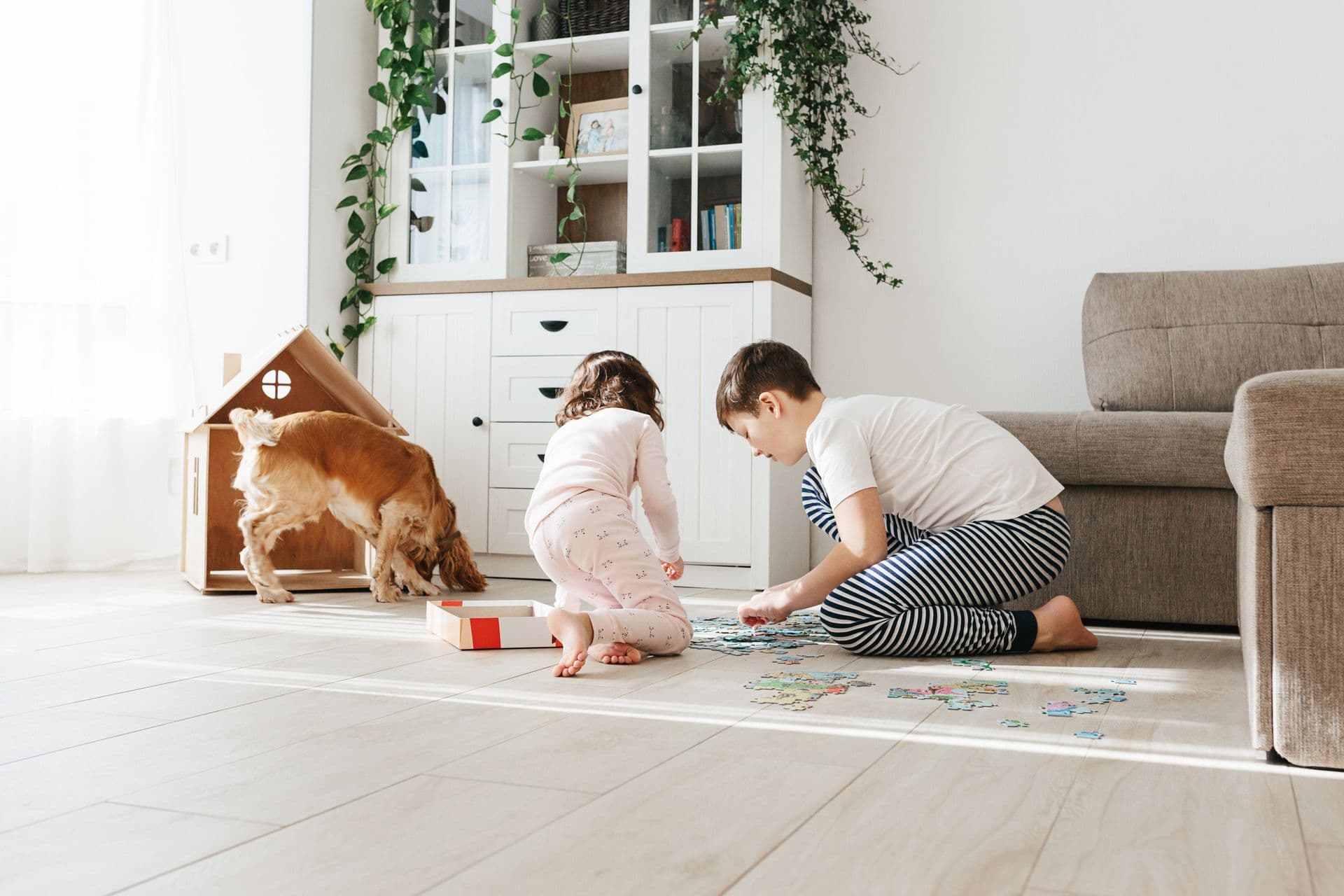
Mon - Thu: 8AM-8PM
Fri - Sat: 8AM-6PM
Sun: 10AM-5PM


